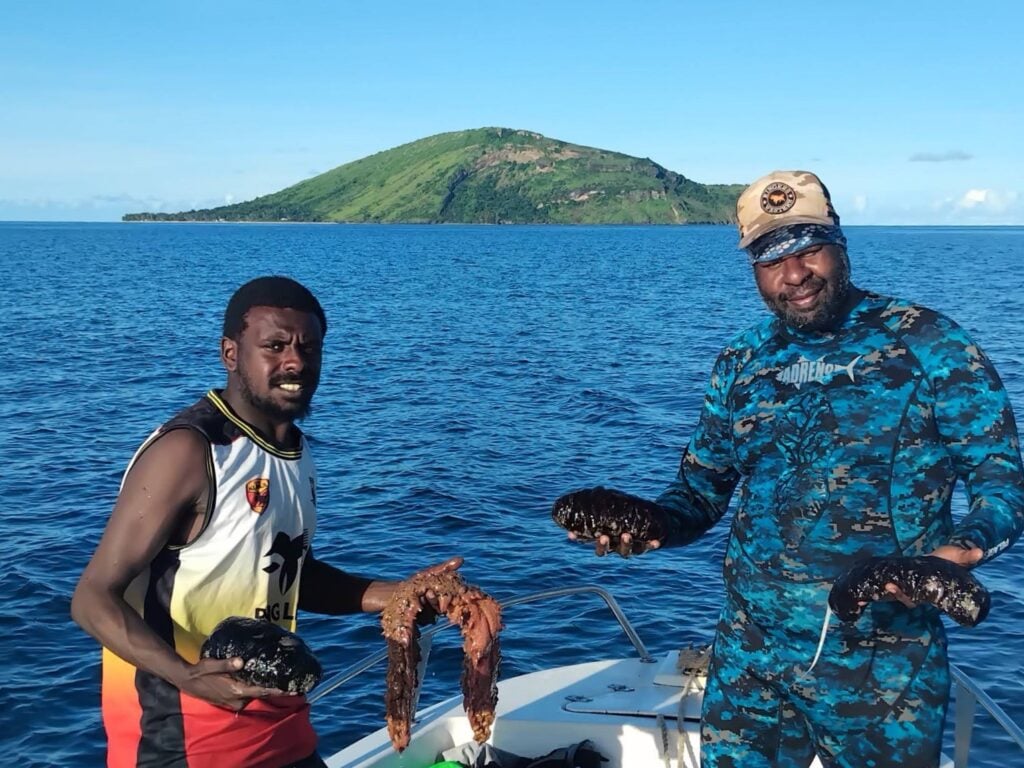
In Far North Queensland, Torres Strait fishers have harvested a record 19.22 tonnes of bech-de-mer – generating an estimated $700,000 for the local economy during a short but successful three-day season (3 to 5 March 2025).
Back in 2023, the region’s beche-de-mer fishery re-opened after a 20-year closure to support regeneration of black teatfish and increase stock levels so the species could be harvested sustainably and in accordance with strict minimum size limits.
Now the beche-de-mer industry – and black teatfish species – is thriving in the hands of First Nations fishers from the outer islands of the Torres Strait to the Northern Peninsula Area.
The beche-de-mer – also known as sea cucumber – is the second highest-earning fishery in the Torres Strait after Tropical Rock Lobster.
The high-value product is considered a luxury seafood product in the lucrative Asian markets.
Local fishers can earn up to $40 a kilo at ‘beach prices’, with buyers then exporting the dried delicacy worldwide.
Most of the region’s beche-de-mer is harvested from waters surrounding Mer, Erub and Ugar islands in the eastern Torres Strait.
Kemer Kemer Meriam man John Tabo is a local commercial fisherman and representative for the region’s hand collectables working group.
He said the beche-de-mer industry was one of the highest earning fisheries in the Torres Strait region for locals.
“The black teatfish opening date was set at the right tides and time,” Mr Tabo said.
“Plenty of fishers look forward to the season opening, it benefits everybody in the whole community.”
Torres Strait Regional Authority (TSRA) Chairperson George Nona said local people were harnessing seafood in a way that supported employment, economic development and sustainable, locally owned fisheries.
“The beche-de-mer fisheries as part of the region’s hand collectables fisheries is 100 per cent owned by Torres Strait Islanders and Aboriginal people,” Mr Nona said.
“This year’s season is a good news story not just for the fishing industry, but for the many families and communities it supports across the region.
“There’s a shared sense of achievement when we can provide for our families by using our skills and knowledge of the sea.
“A successful fishing season goes beyond just dollar value, it has the power to uplift families and boost morale across every island in the Torres Strait, you can feel the pride across our communities,” he said.
More than 150 Traditional Inhabitant Boat Licence Holders have exclusive access rights to catch black teatfish, generating hundreds of thousands of dollars for the local economy each year.
This year’s black teatfish season had a 22-tonne allowable catch limit – two tonnes higher than last year.
The hand collectable fisheries in the Torres Strait – including the bech-de-mer fisheries – is 100% owned by Torres Strait Islanders and Aboriginal people across the Torres Strait and Northern Peninsula Area.
Hand collectable fisheries in the Torres Strait also include crab, trochus and pearl shell.
TSRA is a member of the Protected Zone Joint Authority (PZJA), which is responsible for the management of commercial and traditional fishing in the Australian area of the Torres Strait Protected Zone (TSPZ) and designated adjacent Torres Strait waters.
As a PZJA partner, TSRA proudly supports consultation and local decision making aligned with community aspirations.
Learn more about www.tsra.gov.au/fisheries
About TSRA
Located in the nation’s far north, TSRA is one of the most remote federal government agencies and supports programs across the region, including for 17 inhabited islands of the Torres Strait and the communities of Bamaga and Seisia on the Northern Peninsula Area of mainland Australia.
It is a statutory body and the lead Commonwealth agency in the Torres Strait for Indigenous Affairs, operating under the direction of a community-elected board.
The Torres Strait stretches 150 kilometres northwards from Cape York Peninsula to Papua New Guinea (PNG) and up to 300 kilometres from east to west. This 48,000 km² area includes more than 270 islands and reefs.
TSRA’s vision is Yumi pasin – yumi Ailan Kastom. Strong in culture, unified partnerships to achieve a sustainable future.

